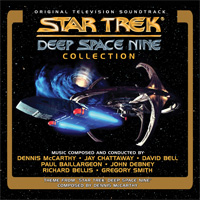 Two weeks ago saw the release of the latest Star Trek soundtrack from La-La Land Records – a 4 CD collection of music from Star Trek: Deep Space Nine. The set marks the first release of music solely dedicated to Deep Space Nine in 20 years after GNP Crescendo put out the original soundtrack to the shows pilot, “Emissary” composed by Dennis McCarthy back in 1993 (the label did release two “Best Of” compilations featuring music from the show, albeit limited to just a few tracks a piece).
Two weeks ago saw the release of the latest Star Trek soundtrack from La-La Land Records – a 4 CD collection of music from Star Trek: Deep Space Nine. The set marks the first release of music solely dedicated to Deep Space Nine in 20 years after GNP Crescendo put out the original soundtrack to the shows pilot, “Emissary” composed by Dennis McCarthy back in 1993 (the label did release two “Best Of” compilations featuring music from the show, albeit limited to just a few tracks a piece).
After the positive response we received to our interviews with the Star Trek: The Original Series Soundtrack producers back in December 2012, we decided to do the same for this set. TrekCore caught up with producer Ford A. Thaxton to discuss the music of Deep Space Nine, his motivation behind track choices, Star Trek composers and how to whittle down 172 episodes full of music to a 5-hour compilation! We’ve also got a selection of sample tracks for your listening pleasure at the bottom of the page.
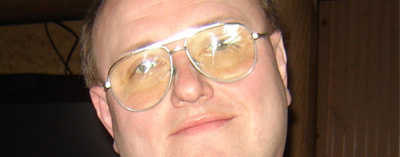
Ford A. Thaxton: Star Trek DS9 Soundtrack Interview, Part 1
Interviewed by Adam Walker for TrekCore.com
![]()
TrekCore: Let’s talk a little bit about Deep Space Nine! Could you tell us a little bit about how you’re involved with this album project? What were your responsibilities?
Ford A. Thaxton: Well, Dennis McCarthy – who was a primary composer on the show, along with Jay [Chattaway] – we go back many, many years. During the course of Deep Space Nine, I was producing soundtrack albums and I helped [GNP Crescendo Records] out on some of those – what happened here is that I always wanted to do something that was representative of the series.
There was talk about doing something when DS9 was ending, a big ending album that unfortunately never came together. I had put it together with Mark Banning and James Nelson – who’s our mastering engineer – but it never came together, so I kind of put it in the drawer. Fast forward; Michael V. Gerhard and Matt Verboys, the owners of La-La Land Records, who I work with quite a bit, they did the Star Trek: The Next Generation one which I worked on because I had a long history there; we all did. When the time came to do Deep Space Nine – they asked us if we were interested and we said, “Fuckin’ A!” That’s the truth of it!
Originally, it was going to be a three-CD set for cost reasons, but one of the other people who produced it – Lukas Kendall, who took care of getting all of the clearances and doing all that stuff with CBS – agreed with me that we should do a four-CD set, and that kind of allowed the whole project to move ahead, and do it in a similar fashion to what we had done for the TNG box, which is: the first CD would be Dennis McCarthy, since he was the primary who started the show; Jay Chattaway would have his own CD; the third CD would be excerpts from all of the other composers who worked on the show – some of them only did one show, others did many – but I wanted to have everyone represented there. Mark, James and I all agreed that we had to have everybody there in some fashion, which we were able to do.
The fourth CD is essentially the project we had originally planned back in the Nineties – it was music from “Our Man Bashir” by Jay Chattaway, Dennis McCarthy’s score for “Trials and Tribble-ations“, and the final DS9 two-hour show (“What You Leave Behind“) – that was kind of the vision we all had for it. La-La Land Records and Michael Gerhard and Matt Verboys went with us on this, and everybody was really, really happy to do it in this fashion.
TrekCore: So, this is the “Lost Album” – why was it lost, and why have we never heard of it?
Ford A. Thaxton: Well, what happened was, this project – you have to bear in mind a bit of history here, that Mark Banning, myself, and James Nelson have been working together for twenty years or more, in one fashion or another. When GNP Crescendo Records had the Star Trek franchise, we always wanted to do some more DS9 because while [GNP] Crescendo had done the pilot (“Emissary“), they hadn’t done any more than that because musician’s union regulations during that period were very cost prohibitive. So, they eventually did The Best of Star Trek – those two releases – which had something from each of the series.
They had done well, and there was talk about doing a third one, which is when I prepared “Our Man Bashir” with Mark, and James edited it together and signed off on it. The problem there was, they didn’t do a third one, and there was apparently some other issue at some point… that’s why they never showed up.
When it came to the end of the show, the big finish – I was there at the recording session with Mark – we always thought the score was so good, it should go out on its own. With Dennis’s help, and James cutting it all together, we put together an album which would have been DS9 Volume 2, which would have been “Trials and Tribble-ations” and [“What You Leave Behind“]. We did that, but unfortunately, Crescendo elected not to do the project – so, as I said, into the drawer! I put that aside, knowing, well… someday.
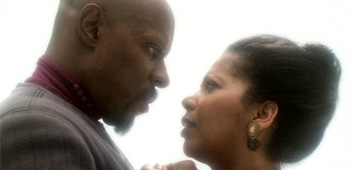
The heartrending score to “What You Leave Behind” is included on the fourth disc – the ‘Lost’ Album – originally intended for release over a decade ago.
TrekCore: It’s been hanging around for fourteen or fifteen years, then, unreleased!?
Ford A. Thaxton: Yeah, well, it’s a good thing my drawer is a very safe place to be, I can assure you! What happened was – when it came to this – we went back and we cracked it open, listened to it again all these years later, and we said, “Damn, that’s fine!” Like, okay, that’s it!
I think that the only difference… for time consideration, we had to pare it down a little bit. You listen to something fourteen years later and you think it’s not that interesting. As a great musician once said, “The most important notes are the ones you leave under the desk.”
TrekCore: Who said that!?
Ford A. Thaxton: I have no freakin’ idea – that’s why God invented Google!
That’s how it all came together. The most interesting thing on the last score – “What You Leave Behind” – is that one of the cues in the show is significantly different from within the show. In the last show, there’s a big montage at the end, showing everybody going their separate ways, right? Dennis wrote the piece, which incorporates this other song, this jazzy, marvelous…. When they recorded it – I was there – everyone just went nuts! It was great, it was wonderful! Up in the recording booth, the producer – I forget who it was – said, “Fine, great, no alternates – let’s go!”
It was a wonderful moment. A week or so later, we get to see the show on the air – we found out that in the intervening time, Rick Berman himself had some issue with it; he thought it was too jazzy, so he took out the saxophone or the trumpet or something. We’re sitting there at home, watching, like, “What the hell happened!?”
TrekCore: Oh, no!
Ford A. Thaxton: In this particular release, we went back to the way Dennis had done it originally; the way it was all approved – up until Rick went down to the dub stage.
TrekCore: The original release, as it was composed by Dennis, is on the Lost Album?
Ford A. Thaxton: Yes. That is what was supposed to be there, and if anybody wants to be really industrious, they can extract it and put it against the visuals – they’ll see it’s awesome. The other thing that’s interesting about the last score – and this is just me being a pure geek – is that when Dennis was doing the score, we talked all the time. The one thing I badgered him about, I said, “Dennis, listen to me – if you can fork it in anyplace, use the theme from “The Visitor” one more time.” There’s this piece which I think is referred to as “One Last Visit” [Disc 1, Track 19] – this whole thing at the end of “The Visitor” which is this great, emotional piece, as Jake Sisko essentially decides to kill himself in order to save his father – there’s a spoiler alert!
I said, “Come on, Dennis, use it! Come on!” He called me back and said, “Well, I think there is a place I can use that.” Then he basically reused that tune for the final farewell between Sisko and Kasidy.
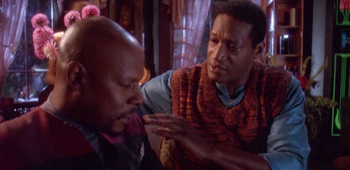
Ford Thaxton recalls how he badgered Dennis McCarthy to re-use his iconic theme from “The Visitor” in the music for the series finale, “What You Leave Behind“.
TrekCore: That’s probably one of the more recognizable pieces from all of the spin-off series, I’d say.
Ford A. Thaxton: I would say so, too. I wasn’t there when they recorded “The Visitor“, but I was there when they recorded [the finale]. It just destroyed me! I mean, I was just sitting there, like, “Oh, god…” It was a lot of fun.
The other thing about the box set, overall, is what we tried to do – and it really came down to Mark, James, and me – we wanted to balance it. On one hand, we wanted an album that was musically interesting to listen to, divorced from the visuals, but it also had to balance that with having stuff people remembered from the show, and from those ‘big’ episodes – which sometimes didn’t always go hand in hand. In this case, it did – in the case of, like, Dennis, the producers were a lot less stringent than they were on TNG. DS9 had more latitude.
In CD 1, when we were putting that together, we balanced certain things. With an episode like “The Storyteller” – which is, essentially, where the whole Miles O’Brien / Bashir friendship started – it had a really good score to it, but it’s a first-season episode; I don’t think it’s going to be on anybody’s Top 50 list. But, it had a great score – so much so that Dennis actually extracted a bit of it into his Deep Space Nine concert suite, and we knew we had to include that.
There was a moment from another first season episode called “Duet” – which I would argue is one of the great DS9 episodes, about this gentleman who claims to be a Cardassian war criminal, played by Harris Yulin; he isn’t [a criminal], and at the end of it, he’s made peace with it, and walking on the Promenade, this Bajoran who thinks he is a war criminal just knifes him and he dies in Kira’s arms. We had to have that moment, because it’s got this beautiful trumpet going… that’s the one thing on Dennis’ CD – if you died in the show, your music is probably on the CD! We killed Harris; we killed Vedek Bariel in “Life Support” – we have that music; we have Kor’s final swan song (from “Once More Unto the Breach“); we also used the music from “The Visitor“, so it’s kind of Jake Sisko dying. If you’re getting killed, you’re on this set!
The other thing we included on Dennis’ set, which was fun – Dennis had gotten some of the crossover shows, in the Alternate Universe. Everybody on the show loved those episodes, and we made sure we included music from those two (“Crossover” and “Shattered Mirror“) which is a lot of fun. There’s one cue that’s a little bit different from what you heard on the show, called “Charge!” [Disc 1, Track 20] – that’s for the big battle at the end of “Shattered Mirror” – Dennis basically had George Doering, this guitar guy… he’s got this whole guitar thing which is just so cool! We said that we had to have that. There’s also this short little cue from [“Far Beyond the Stars“], this little jazzy cue we included from that.
When you’re doing a show like this, you try for a balance. You can’t just have seventy-five minutes of doom and gloom and all that; that doesn’t make for a lot of fun. I think the other cue we included on the Dennis CD – we had a lot of fun including it – was the whole marriage ceremony for Dax and Worf [from “You Are Cordially Invited…“]. We wanted something to end the set that was a little upbeat, and what’s funny about that one – when they did the show, it’s all Klingon music with taiko drums. We started joking: we know where [Battlestar Galactica composer] Bear McCreary listened to this – just kidding, Bear – because it got that Galactica kind of vibe, well before Galactica. We just thought that was so much fun, because Dennis got to have some fun with it.
Now, in the case of Jay Chattaway’s CD, that was a different animal because we tended to focus on what felt right for Jay – what I call the mythology shows. It just felt right; he responded to the whole thing dealing with the Founders and the Dominion, Odo… all that stuff.
TrekCore: There’s a lot of war music on that CD.
Ford A. Thaxton: Yeah, it has a lot of that, but also has a lot of that whole mythology of the show. Jay tended to respond, as music composer, to those shows dealing not only with the Dominion, but the Pah-wraiths and the Wormhole Aliens, and all of that. Also, he could just write an action cue like you wouldn’t believe. There’s one really great score [from “Call to Arms“]; there’s this great kind of idea in that score – which unfortunately, they didn’t use more, which is too bad – this kind of theme for Gul Dukat and the Dominion as they come and take over Deep Space Nine. It is just that great stuff.
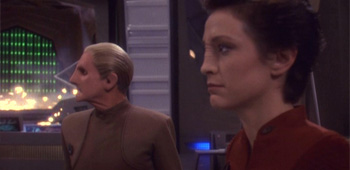
Fans have been clamoring for the original music to episodes such as “Call to Arms” ever since Deep Space Nine was first on the air. Jay Chattaway and David Bell’s impressive selection of Dominion War music is represented well over the second and third discs in this collection.
With Jay, he would come in, and that was the focus with him. Jay’s last episode – he ended earlier than I would have thought – was “The Changing Face of Evil“, and his last show was where he got to destroy the Defiant. We included that, because he said we had to have that moment – and then the whole speech where Damar tells the Cardassian people to rise up against the Dominion.
TrekCore: It’s a beautiful moment; that speech still sticks in my mind.
Ford A. Thaxton: Jay’s album tended to go there because, contrary to a lot of intellectualization, it came down to what felt right… then again, I couldn’t leave off any cue off of the album called “The Ultimate Handjob”!
TrekCore: Where’s that from!?
Ford A. Thaxton: That is a scene where Odo links, I think, with the Founder. So, “The Ultimate Handjob”. [Disc 2, Track 5]
TrekCore: Ah. I see. Who comes up with these cue names?
Ford A. Thaxton: The cue names tended to be made up by the music editor on the show – and most of the time, when they make up these titles, they’re not thought up for public consumption. It’s like one of the questions I had when I did the TNG set – the last cue in “All Good Things…” is an odd title, called “I’ve Got a Gun”. The reason that’s there is this: Dennis worked hard on that score, and it was a cue we really liked, so when we went down to the dub – which is where they mix everything together for the final show – he didn’t really want to that cue to be messed with, so that was the title! “I’ve Got a Gun!” So the music editor told everybody, “I don’t think we should mess with this one!”
We tend to stick with the titles on the albums, by the way, because those are the official names of the compositions – so if you ever wonder why something is called “Yo!”, it’s a favorite phrase of Dennis McCarthy’s, he always says, “Yo yo yo, and yo!”
Now, part of doing this set, before we go any further, everyone who worked on this set – me, Mark Banning, James Nelson, and Lukas Kendall – we were all huge DS9 fans and we knew what we wanted, and we went for everything we thought were the big moments of the show.
TrekCore: How do you go about choosing these tracks? Do you confer with the composers themselves?
Ford A. Thaxton: The way it worked here is that I went through it – and I knew this because I’d been close to it all along – I said, “Okay, these are the ones for Dennis; these are the ones for Jay.” The “New Recruits” CD is the one where I had to go back and re-familiarize myself with those, and those are actually really interesting. The people other than Jay and Dennis were David Bell, who did a lot of shows, and Paul [Baillargeon]
We knew the big shows. You just look them and just kind of know – that one, and that one, and that one…. Then, we’d go to Jay or Dennis or whoever, and say “What do you think?” Dennis would just say, “Oh, those look good. Fine.” Jay, too. They kind of trusted us; we went through the whole process and when we did the assemblage, they heard it and said it sounded great.
The third CD was the toughest one, in a sense. I wanted to have everybody who worked on the show represented in some fashion – I didn’t get to do that on TNG because there was some issue where they couldn’t find paperwork on one score by George Romanis [Season 1’s “Too Short a Season“]; someday, I hope to get that out there. So, on this one, I said that we had to get everybody. We kind of lined everybody up, and then – I always tell people that seeing a soundtrack album made is like sausages. If you enjoy them, you don’t want to see the production process.
Originally, the first cut was 93 minutes, but you can only get like 78 onto a CD, so you start having to go back and deciding [the final selections] have to be extra, extra good to make the cut. That’s how it worked on that one. I knew John Debney was going to be there to start it off, because he was the first guy to come on board – he did two episodes in the first year – that wasn’t Dennis or Jay. His first show was [“The Nagus“]; his second was one that I would argue is one of the first episodes where DS9 really started crystallizing, called “Progress“. I think it was also one of the last performances by Brian Keith, as this Bajoran on this moon – they have to terraform it for the Cardassians or something; he has to leave, and Kira has to essentially burn his house to the ground at the end of the episode to get him to leave! John came in and wrote this wonderfully emotional cue for it, and I said that it had to make it. Richard Bellis did another one, he only did one show [“The House of Quark“], but it was one of those scores that’s really short, but we had a brief moment in it that we though was really good and we had it included.
The other big composer besides Jay and Dennis was David Bell. He got a lot of action shows; big shows. I think the first one we included was “The Sword of Kahless“, which is this wonderful story about looking for this religious artifact of Kahless, and how it kind of drives Kor and Worf crazy; they have this fight, and then eventually toss it into outer space – which was just wonderful. Of course, for David Bell’s work, the episode that everybody just said had to be there was “In the Pale Moonlight“, which is arguably one of the best episodes of DS9 – or any Star Trek, for that matter. That had this very dark, almost Herman-esque score underlining the whole story.
We looked at the score, and we knew the first cue had to be there; the cue where Stephen McHattie [Vreenak] turns around and goes, “It’s a faaaaake!”… we just said that has to be there! There’s a cue in the last act where Sisko goes to confront Garak; and then the last cue, which ends the episode. That was it – that was what mattered.
After that, we decided to include a piece from another episode Dave did, called “Take Me Out to the Holosuite“, which is a little frothy, fun episode – David Bell had this long, four-minute piece on it, underscoring the baseball montage, which was just a hoot; it was just fun!
TrekCore: It was such a departure from the normal style of music, as well.
Ford A. Thaxton: Well, actually, the version you hear on the album was toned down for the [episode] – but everything you hear on the album is the way the composers delivered it. This is what they recorded on the stage. What they did on the dub stage, I don’t really care about, because it’s never pretty!
Go to Part: 1 2
We have some special preview tracks from Discs 1 and 2 of the set below:
- The Great Escape (from “The Homecoming“, Dennis McCarthy)
- Bajoranosity (from “Crossover“, Dennis McCarthy)
- Demolished / Escape / Hard to Digest (from “The Die is Cast“, Dennis McCarthy)
- Sailing (from “Explorers“, Dennis McCarthy)
- Back to the Future (from “Far Beyond the Stars“, Dennis McCarthy)
- Hirsute Pastola / Klingon Wedding Drums / The Ceremony / Bashing (from “You Are Cordially Invited…“, Dennis McCarthy)
- The Adventure Begins / Run Silent, Run Deep (from “The Search, Part I“, Jay Chattaway)
- The Ultimate Handjob (from “The Search, Part II“, Jay Chattaway)
- Program Sisko / Gotta Job to Do / Message in Horsehide (from “Call to Arms“, Jay Chattaway)
- The First Shall Be The Last (from “One Little Ship“, Jay Chattaway)
- Defiant Ending (from “The Changing Face of Evil“, Jay Chattaway)
- Girls in a Cage, The Fab DS9 Band (from “Our Man Bashir“, Jay Chattaway)
The 4 CD Star Trek: Deep Space Nine Soundtrack Collection is available to order now from La-La Land Records at their website, www.lalalandrecords.com. The set is limited in number to 3000 units and will set you back a very reasonable $49.98, working out at under $12.50 a disc. Stay tuned to TrekCore for our full review of the set coming soon!
